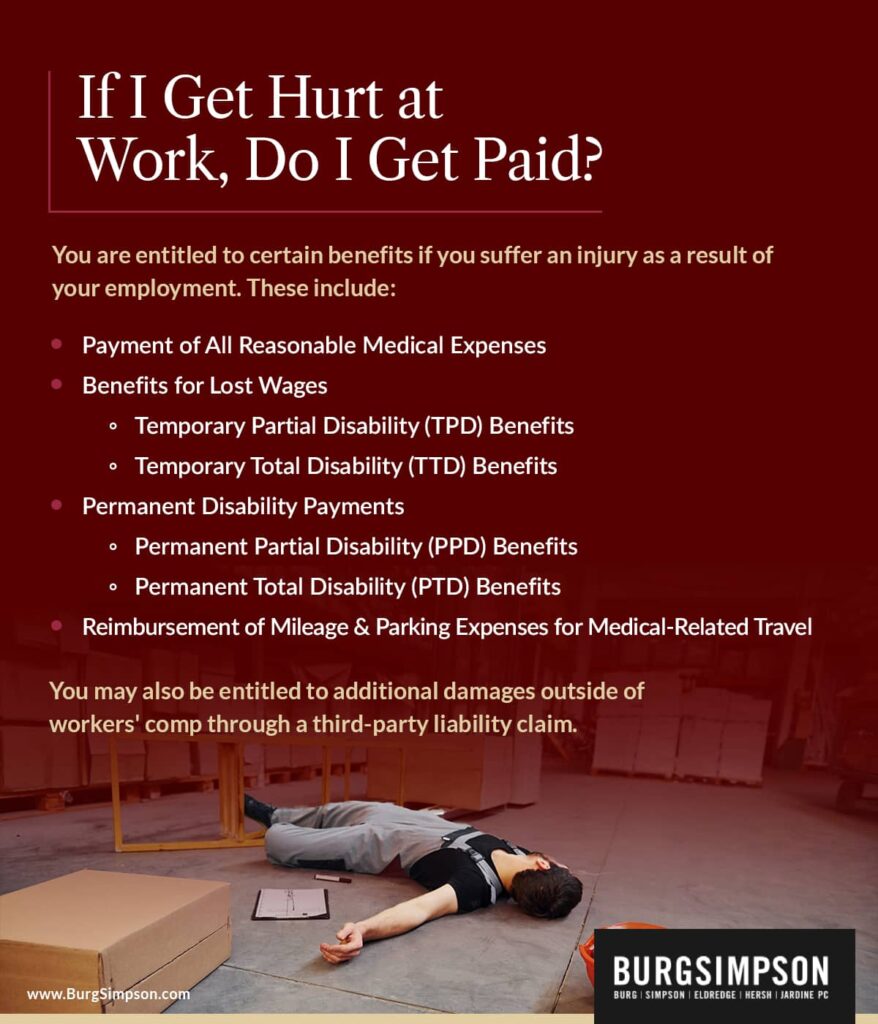
What Are My Rights If I Was Injured at Work in Colorado?
The Colorado workers’ comp law provides rights and legal protections to workers who are injured on the job. A knowledgeable lawyer can help protect your rights and obtain the full benefits you deserve.
Despite the rights guaranteed by the Colorado workers’ comp law, employees may encounter difficulties in filing a claim and getting the benefits they are owed. At Burg Simpson, our Colorado workers’ compensation lawyers are committed to providing high-quality legal counsel and support for workers who have been hurt on the job.
Call Burg Simpson at 303-792-5595 today for a FREE and confidential case evaluation. Our team has an in-depth understanding of the Colorado workers’ comp law, and we can help with all aspects of your claim.
I Was Injured at Work; What Are My Rights?
People need to go to work in order to make a living that will provide for their daily expenses. No one expects an accident to happen while they are on the job, or that they will become seriously injured as a result of that accident.
The good news is that when this happens, employers are required to provide workers with treatment for their injuries and partial payment of their wages while they are off work. Those rights can provide the necessary compensation needed so injured workers can pay for any expenses related to their injuries and get back on the road to good health as quickly as possible.
Do I Get Paid If I Get Injured at Work?
Yes, you are entitled to certain benefits if you suffer an injury as a result of your employment. These include:
- Payment of all reasonable medical expenses related to the work injury
- Benefits for lost wages:
- Temporary Partial Disability (TPD) benefits; if you are able to work but in a diminished capacity, TPD benefits will make up the difference in your wages.
- Temporary Total Disability (TTD) benefits, consisting of two-thirds of your regular wages while you are unable to work.
- Permanent disability payments:
- Permanent Partial Disability (PPD) benefits; PPD benefits are provided for a set number of weeks based on the part of the body that has sustained permanent medical impairment (see the Colorado Workers’ Compensation Act § 8-42-107).
- Permanent Total Disability (PTD) benefits pay two-thirds of your pre-injury wage if you are no longer able to work.
- Reimbursement of mileage and parking expenses for doctor’s appointments and other medical-related travel
Workers’ compensation benefits are paid by the employer’s workers’ comp insurer. As with any legal matter where insurance companies are involved, liability may be disputed or the claimed losses may not be fully covered. An attorney can review the details of your case, assist you in filing a claim, and preserve your rights under the Colorado workers’ comp law.
Colorado Workers’ Compensation Rates 2023
Every fiscal year, the Colorado Department of Labor and Employment’s Division of Workers’ Compensation (DOWC) modifies the schedule for workers’ compensation benefits. The DOWC has set the following maximum rates for workers’ comp benefits in FY 2023–24:
- Maximum temporary disability benefit per week: $1,293.25
- Weekly PPD payments maximum for scheduled loss: $405.84
- Weekly PPD payments for non-scheduled loss: $150 minimum / $710.58 maximum
- Maximum benefit for bodily disfigurement: $6,846.50
- Maximum benefit for extensive scarring of the face or body, burn scars, or stumps from amputation injuries: $13,690.57
- Lump sum payment maximum (injured worker or sole dependent): $119,299.72
- Lump sum payment maximum (multiple dependents): $238,596.43
Workers’ compensation rates are subject to change. It can also be difficult for employees to know what benefits they are entitled to, as well as the maximum compensation allowed. For knowledgeable guidance concerning your workers’ comp benefits, it is in your best interest to speak with a lawyer as soon as possible.

Workers’ Compensation in Colorado
Employees injured on the job are protected under the Colorado Workers’ Compensation Act. The act provides the framework for employees to get workers’ compensation benefits under their employer’s policy any time they become hurt while at work.
Under the workers’ compensation system in almost every state, employees cannot pursue a claim against an employer for negligence related to their injuries. This is generally the case even if the employer or a co-worker was the cause of the accident that resulted in injury.
Workers’ compensation in Colorado runs on a no-fault system. This means that it does not matter if the employee contributed to the accident that caused his or her injury. The employee still has the right to receive workers’ compensation if he or she was hurt in the course and scope of their employment.
Is Workers’ Comp Required in Colorado?
Colorado law requires that nearly every employer, with very few exceptions, carry workers’ compensation insurance in the event that an employee becomes hurt on the job. Unfortunately, not all employers play by the rules.
Some employers will try to classify an employee as an independent contractor; however, in many cases that person would be an employee for the purposes of workers’ compensation or unemployment benefits. In these situations, it is likely that an injured employee would need an attorney’s assistance in getting covered.
An employer can never deduct the cost of the workers’ compensation insurance from an employee’s wages. Independent contractors and subcontractors, meanwhile, may be required to obtain their own insurance.
Employer’s Responsibilities
Workplace Safety
Although employees cannot file a lawsuit against an employer if they are hurt on the job, employers still have certain responsibilities. This includes following all applicable standards and regulations established by the Occupational Safety and Health Administration (OSHA), as well as obeying state and local laws for maintaining a safe working environment for all employees at all times.
If an employer violates any of these safety regulations, they could face high fines and even criminal charges. In the event that an employee notices a violation, he or she can report it to OSHA by filing a health and safety complaint. Employers cannot retaliate against any employee who reports such a violation.
Designated Medical Providers
When an employee becomes injured while at work, he or she must report it to the employer or supervisor immediately. If it is an emergency, the employee has the right to seek medical treatment from the closest hospital or medical facility; however, if it is not an emergency situation, then the employee must go to one of the designated medical providers selected by the employer.
Designated medical providers are individual doctors, treatment facilities, and other providers authorized to provide care to employees in the event of a workplace injury. A minimum of four designated providers must be located within 30 miles of the workplace.
In Colorado, the employer is required to provide the employee with a list of approved healthcare providers who can offer additional or ongoing treatment. The employee is allowed to choose one of the four to be the authorized treating physician for the injury. If the employee does not like that physician or clinic, he or she is allowed a one-time change in the first 90 days to another one of the four designated providers on the employer’s list.
Injury Reporting Requirements
After the worker reports an injury, the employer should notify the workers’ comp insurance carrier as soon as possible. If the injury results in more than 3 days or shifts where the employee is unable to work and/or permanent impairment, the insurance carrier has up to 10 days to submit a First Report of Injury with the Division of Workers’ Compensation (DOWC). The insurer then has 20 days to accept or reject liability.
Employees also have the option to file a workers’ comp claim with the DOWC. An attorney can help you complete and submit the Worker’s Claim for Compensation form (WC 15), review the decision of the carrier, and—if liability is disputed—appeal the denial of your claim.
Third-Party Claims
Although employees are barred in most cases from filing a personal injury lawsuit against their employer, they can potentially file a lawsuit against a third party whose negligence caused or contributed to their work-related injury. Third parties consist of individuals and entities that do not work for the same employer, but still caused the accident that resulted in injury to the employee.
For example, a courier is driving a company truck while completing his route. Another driver not associated with the company the courier works for drives through a red light and smashes into the courier’s truck. The courier driver sustains serious injuries that leave him with high medical bills and an inability to return to work. In this scenario, the courier could file a personal injury lawsuit against the at-fault driver who ran the red light and hit the courier truck.
The primary benefit of a third-party liability claim is the opportunity to recover compensation for losses that are not covered by workers’ comp. In addition to future medical expenses and all current and future lost wages, injured workers may be entitled to recovery of damages for pain and suffering, loss of enjoyment of life, and more.
An injured worker is still entitled to workers’ compensation benefits while the third-party claim is litigated. If the lawsuit succeeds and the worker is awarded damages, the employer or workers’ comp insurance company has the right to seek repayment of workers’ comp benefits by placing a lien on the injured driver’s recovery.
Were You Hurt at Work? Contact a Colorado Workers’ Compensation Lawyer
Although the Colorado workers’ comp law provides that injured employees can apply for benefits, actually getting these benefits is not always easy. A workers’ compensation attorney in Colorado can help ensure that all injured employees get the benefits to which they are entitled.
Burg Simpson has decades of experience representing injured workers in Colorado. We know the rights guaranteed to employees in Colorado, and we will use our knowledge and experience to get you the workers’ compensation benefits you deserve.
If you have been injured while on the job, contact Burg Simpson today for a FREE and confidential case evaluation. Our attorneys serve workers in Denver and throughout Colorado.






